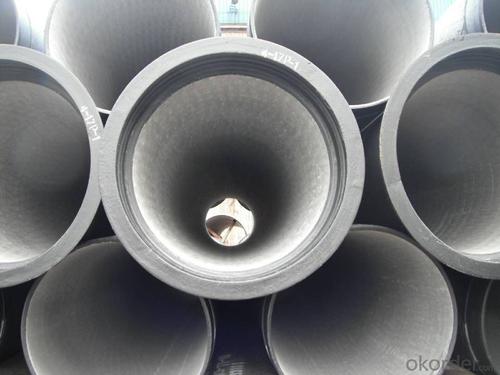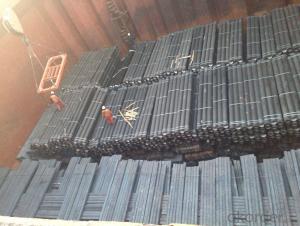DUCTILE IRON PIPE DN150 K9/C
- Loading Port:
- China Main Port
- Payment Terms:
- TT OR LC
- Min Order Qty:
- -
- Supply Capability:
- -
OKorder Service Pledge
OKorder Financial Service
You Might Also Like
Specification:
1) The standard of pipe: ISO2531:1998, K9
2) Effective length: 6m
3) Inner cement line: Portland cement line as per ISO4179
4) Zinc coating: at least 130g/m2 as per ISO8179
5) Bitumen painting: at least 70um as per ISO8179
6) With 100% quantity of NBR ring, or SBR ring, or EPDM ring as per ISO4633
7) DN80mm-800mm
8) High strength, lighter than grey iron, good corrosion resistance, no furring, small flow resistance, easy fixing, long life tome about 100 yeas
9) Produced by Hangzhou chunfeng machine
10) Checked by automatic inspection equipment
11) Composition:
Chemical composition | |||
Chemical composition | Ductile Cast Iron Pipe (%) | Grey iron pipe (%) | Steel pipe (%) |
C | 3.5-4.0 | 3.2-3.8 | 0.1-0.2 |
Si | 1.9-2.6 | 1.4-2.2 | 0.15-0.4 |
Mn | 0.15-0.45 | 0.4-0.6 | 0.3-0.6 |
P | ≤0.06 | ≤0.3 | 0.02-0.03 |
S | ≤0.02 | ≤0.1 | 0.02-0.03 |
Mg | 0.03-0.06 |
|
|
12) Feature:
Mechanical properties | |||
| Ductile Cast Iron Pipe | Grey Iron Pipe | Steel Pipe |
Tensile Strength(Mpa) | ≥420 | 150-260 | ≥400 |
Yield Strength(Mpa) | ≥300 | No Confirmation | No Confirmation |
Bending Strength(Mpa) | ≥590 | 200-360 | ≥400 |
Elongation (%) | ≥10 | Neglected | ≥18 |
Brinell Hardness(HBS) | ≤230 | ≤230 | About 140 |
13) T type mechanical joint
14) Packing: in bulk or container
- Q: How does ductile iron pipe perform in extreme temperatures?
- Ductile iron pipe is renowned for its exceptional performance in extreme temperatures, thanks to its unique composition and manufacturing process. Its structural integrity remains uncompromised, allowing it to endure both high and low temperatures without issue. When it comes to high temperatures, ductile iron pipe showcases remarkable heat resistance. It can withstand temperatures of up to 1000 degrees Fahrenheit, making it perfect for applications involving hot liquids or gases, such as steam pipelines or industrial processes. Its strength and thermal stability enable it to maintain its shape and structural integrity even under extreme heat conditions, guaranteeing long-term reliability and safety. Similarly, ductile iron pipe excels in low-temperature environments. It can brave sub-zero temperatures without becoming brittle or prone to cracking, a common problem with materials like cast iron. This makes ductile iron pipe an ideal choice for applications in cold climates, such as water distribution systems in freezing temperatures. Moreover, the ability of ductile iron pipe to resist thermal expansion and contraction is another advantage in extreme temperatures. It has a low coefficient of thermal expansion, meaning it expands and contracts less compared to other materials. This property minimizes stress on the pipe, reducing the risk of leaks or failures caused by temperature fluctuations. In conclusion, ductile iron pipe demonstrates outstanding performance in extreme temperatures. Its heat resistance, ability to withstand low temperatures, and resistance to thermal expansion and contraction make it a reliable option for various applications, ensuring safe and efficient operations even in challenging environments.
- Q: Can ductile iron pipes be used for underground hydrocarbon pipelines?
- Yes, ductile iron pipes can be used for underground hydrocarbon pipelines. Ductile iron is a strong and durable material that is commonly used in various applications including water and sewage systems, gas pipelines, and even hydrocarbon pipelines. Ductile iron pipes have excellent corrosion resistance properties and can withstand high pressures, making them suitable for transporting hydrocarbons underground. However, it is important to consider factors such as the specific composition of the hydrocarbons being transported and the environmental conditions of the pipeline route to ensure proper material selection and corrosion protection measures are implemented.
- Q: Are ductile iron pipes suitable for horizontal directional drilling (HDD) installations?
- Yes, ductile iron pipes are suitable for horizontal directional drilling (HDD) installations. They possess the necessary strength and flexibility to withstand the drilling process and can be easily installed underground without compromising their structural integrity.
- Q: Can ductile iron pipe be used for gas distribution systems?
- Yes, ductile iron pipe can be used for gas distribution systems. Ductile iron pipes have proven to be reliable and durable, making them suitable for carrying natural gas and other gases in distribution systems. They have good corrosion resistance, high strength, and can withstand high pressure, making them a commonly used material in gas distribution infrastructure.
- Q: Do ductile iron pipes require internal linings for potable water?
- Internal linings are not required for potable water in ductile iron pipes. Ductile iron, a type of iron that has been strengthened and made more flexible, is commonly used in water distribution systems due to its durability and resistance to corrosion. Unlike cast iron or steel, ductile iron pipes have a protective cement-mortar lining. This lining acts as a strong barrier against corrosion and prevents the release of harmful substances into the water. It is applied during the manufacturing process and is designed to withstand the corrosive properties of potable water, eliminating the need for internal linings. Furthermore, the smooth surface of ductile iron pipes ensures the quality and flow of water without the necessity of additional linings.
- Q: What are the typical joint restraint requirements for ductile iron pipes under pressure?
- The typical joint restraint requirements for ductile iron pipes under pressure involve the use of mechanical joint restraints or restrained joint systems. These restraints are necessary to prevent the pipes from separating or pulling apart due to the internal pressure exerted on them. One common type of joint restraint is the mechanical joint restraint, which consists of a series of bolts and clamps that securely hold the pipes together. These restraints are typically applied at each joint of the ductile iron pipes to ensure a tight and secure connection. Mechanical joint restraints provide axial restraint, preventing the pipes from separating in the direction of the pipe axis. Another type of joint restraint used for ductile iron pipes is the restrained joint system. This system involves the use of a specially designed joint that provides both axial and angular restraint. The restrained joint system typically consists of a gasket, a restraining gland, and a series of bolts or wedges. The gasket provides a watertight seal, while the restraining gland and bolts/wedges restrain the pipe joints, preventing separation under pressure. The specific joint restraint requirements for ductile iron pipes under pressure may vary depending on the diameter, wall thickness, and operating conditions of the pipes. It is important to consult the manufacturer's guidelines and industry standards to determine the appropriate joint restraint system for a given application. Additionally, proper installation and maintenance of the joint restraints are crucial to ensure their effectiveness and longevity in restraining the pipes.
- Q: What is the ductile cast iron pipe
- Have not heard of the nodular cast iron pipe pipe, ductile iron may be a tube or a certain short tube is referred to as excellent grade.
- Q: Are ductile iron pipes suitable for underground parking structures?
- Underground parking structures can benefit from the use of ductile iron pipes. These pipes are recognized for their robustness and long-lasting nature, making them an optimal option for underground settings where they may encounter substantial loads or potential impacts. Moreover, ductile iron pipes exhibit exceptional resistance to corrosion, a crucial characteristic in underground environments that are prone to moisture and other corrosive elements. Furthermore, the high tensile strength and flexibility of ductile iron pipes enable them to withstand ground movements and settle without any cracking or breaking, further elevating their suitability for underground parking structures. In sum, ductile iron pipes offer a dependable and enduring solution for fulfilling the drainage and water supply requirements of underground parking facilities.
- Q: How many casting methods are there in ductile iron casting? A 60*6 discus can not have sand holes. Its surface is smooth. What process can be used to make it?
- Is it better to use precoated sand, but only a little higher cost?.
- Q: What are the different accessories available for ductile iron pipe?
- There are several accessories available for ductile iron pipe, including but not limited to, flange adaptors, couplings, valves, fittings, joint restraints, gaskets, and tapping sleeves. These accessories help in connecting, repairing, and maintaining ductile iron pipe systems.
Send your message to us
DUCTILE IRON PIPE DN150 K9/C
- Loading Port:
- China Main Port
- Payment Terms:
- TT OR LC
- Min Order Qty:
- -
- Supply Capability:
- -
OKorder Service Pledge
OKorder Financial Service
Similar products
Hot products
Hot Searches
Related keywords
























